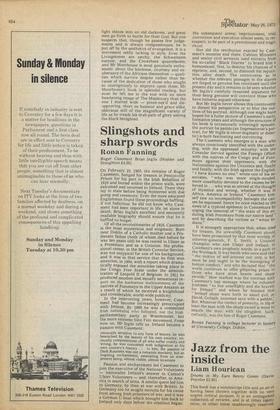Slingshots and sharp swords
Ronan Fanning
Roger Casement Brian Inglis (Hodder and Stoughton £4.50)
On February 23, 1965, the remains of Roger Casement, hanged for treason in Pentonville Prison for his part in the Irish Rebellion of 1916 and buried within the prison walls, were exhumed and returned to Ireland. There they lay in state before being einterred with due pomp and ceremony. Even the more educated Englishman found these proceedings baffling, if not ludicrous; he did not know why Case ment had been important in life, let alone in death. Brian Inglis's excellent and eminently readable biography should ensure that he is baffled no longer. Of all the revolutionaries of 1916, Casement is the most mysterious and enigmatic. Born near Dublin of a Catholic mother and a Protestant father (both of whom died before he was ten years old) he was reared in Ulster as a Protestant and as a Unionist. His professional career, in the British Consular Service, was not untypical for one of his background, and it was in that service that he first won attention, in 1904, with a report which dramatically exposed the atrocities taking place in the Congo Free State under the administration of Leopold II of Belgium. In 1911 he produced another and equally sensational report on the barbarous maltreatment ;of the natives of Putomayo in the Upper Amazon as a result of which he received a knighthood and considerable, world-wide publicity. In the intervening years, however, Casement had become increasingly preoccupied with Ireland. By 1905 he was a committed Irish nationalist who followed, not the Irish parliamentary party at Westminster, but the more extreme Sinn Fein movement. From now on, Mr Inglis tells us, Ireland became a passion with Casement: unusually sensitive to any form of beauty, he was bewitched by the beauty of his own country; unusually compassionate of all who suffer cruelty and wrong, he was consumed with indignation at his own country's history . . . to him, the passion of Dark Rosaleen was not a romantic mockery, but an inspiring enchantment, emanating from an everpresent being, almost visible, almost incarnate Passion and enchantment led Casement to join the executive of the National Volunteers — nationalist Ireland's answer to Carson's Ulster Volunteers — and, thereafter, to America in search of arms. A similar quest led him to Germany, by then at war with Britain. In Germany too he sought recruits for his cause from among Irish prisoners of war, and it was a German U-boat which brought him back to Ireland only days before the rebellion began. His subsequent arrest, imprisonment, trial, .conviction and execution almost seem, in retrospect, to be part of a preordained and tragic ritual.
Nor did the retribution exacted by Casement's enemies end there. Cabinet Ministers and senior civil servants used extracts from his so-called ' Black Diaries' to brand him a homosexual, first, to destroy his chances of a reprieve, and, second, to diminish his reputation after death. The controversy as to whether the relevant passages in the diaries are forged or genuine has continued until the present day and it remains to be seen whether Mr Inglis's carefully reasoned argument for their being genuine will convince those who have hitherto argued otherwise.
But Mr Inglis never allows this controversy to distort his perspective or to blur the outlines of his portrait. Although one might have hoped for a fuller picture of Casement's early. formative years and although the structure of his book is occasionally irritatingly episodic, the portrait he paints (an Impressionist's portrait, for Mr Inglis is never dogmatic or didactic) is both fascinating and convincing. The Casement who emerges is a man who always consciously identified with the underdog, with the oppressed minority; with the Consular Service against the Foreign Office; with the natives of the Congo and of putomayo against their oppressors; with the Nationalists against the Unionists and, finanY and fatally, with the Irish against the English. "I have known no one," wrote one of his associates, "who was more single-minded, more unselfishly devoted to the causes he believed in ... who was so stirred at the thought of injustice and wrong, whether it was in Africa, America or Ireland." Casement himself saw no incompatibility betwen the causes he espoused: hence he once reacted to the news of a typhoid epidemic in Connemara bY urging the removal of "the stain of this enduring Irish Putomayo from our native land and by describing the victims as "white Indians."
It is strangely appropriate that, when tried for treason, the unworldly Casement should havebeen prosecuted by that most worldly of attorney-generals... F. E. Smith, a Unionist champion who saw Ulster and Ireland, in Casement's own prophetic words, as a path to the Woolsack. It was Smith who once said that "the motive of self-interest not only. is but must be and ought to be the mainspring of human conduct," and who declared that "the world „continues to offer glittering prizes to those who have stout hearts and sharp swords." How marked was the contrast with Casement's last message where he exhorted Irishmen "to live unselfishly and die bravely for Ireland" and where he boasted that " Ireland alone went forth to assail evil, x: David, Goliath; unarmed save with a pebble. But, whatever the verdict of posterity, in life at least the man with the sharp sword is wont to impale the man with the slingshot. Such. certainly, was the fate of Roger Casement.
Ronan Fanning is college lecturer in history at University College, Dublin. _


































 Previous page
Previous page